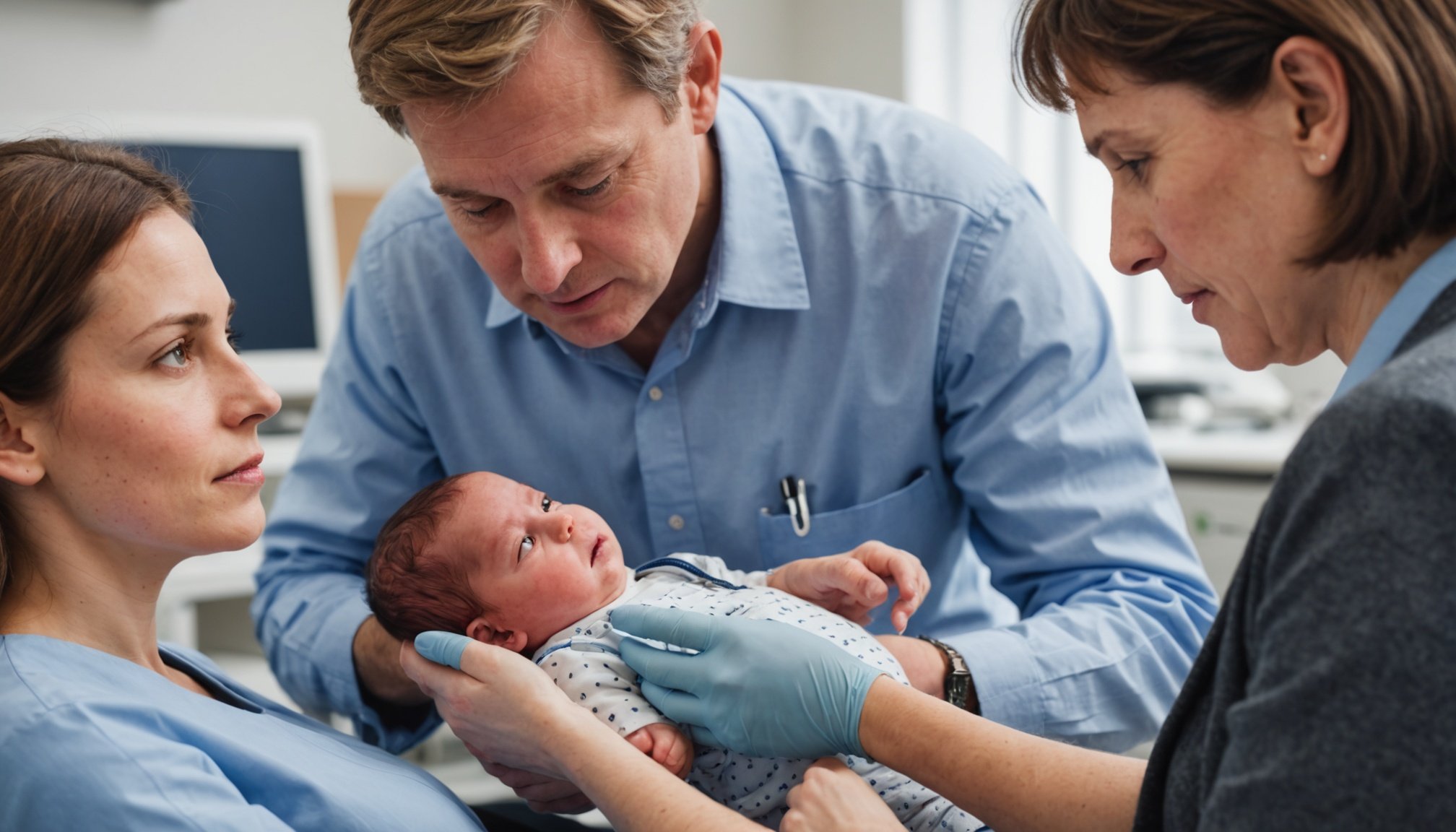Exploring the Impact of UK Geneticists on Prenatal Screening for Rare Genetic Disorders
The Genesis of a New Era in Genetic Screening
In recent months, the UK has embarked on a groundbreaking journey in the field of genetic screening, particularly for rare genetic disorders in newborns. This initiative, spearheaded by NHS England in collaboration with Genomics England, marks a significant leap forward in the early detection and treatment of genetic conditions. Here, we delve into the details of this revolutionary program and its potential impact on healthcare.
The Generation Study: A Pioneering Initiative
The Generation Study is a large-scale research project aimed at screening up to 100,000 newborn babies for over 200 rare genetic conditions. This program is an extension of the existing heel prick test, which currently detects nine rare but serious conditions in five-day-old babies. The new approach involves taking blood samples from the umbilical cord shortly after birth and subjecting them to whole genome sequencing (WGS), a comprehensive method that analyzes an individual’s complete genetic makeup.
This might interest you : Innovative Therapeutic Strategies for UK Psychologists in Treating Phobias: A Comprehensive Guide
How It Works
- Sample Collection: Blood samples are collected from the umbilical cord immediately after birth.
- Whole Genome Sequencing: These samples are then sent to a laboratory for WGS, which identifies all the DNA in the sample.
- Results: Parents are informed within 28 days if a rare but treatable genetic disorder is suspected. If no abnormalities are detected, results are provided within a few months.
The Benefits of Early Diagnosis
Early diagnosis of rare genetic conditions can be life-altering for families. Here are some key benefits:
- Timely Treatment: Identifying conditions early allows for immediate treatment, potentially halting the progression of debilitating diseases and improving the quality of life for affected children.
- Informed Decision-Making: Families can plan their care more effectively, knowing the specific needs of their child from an early stage.
- Reduced Morbidity and Mortality: For treatable genetic conditions, early diagnosis can prevent potentially preventable morbidity and mortality, especially in children.
The Role of Genomic Testing in Rare Diseases
Genomic testing has become a cornerstone in the diagnosis of rare diseases. Here’s how it is transforming the landscape:
This might interest you : Essential Speech Therapy Techniques for Addressing Apraxia in Children: Insights from UK Therapists
Current State of Genomic Testing
- Technological Advancements: The technology to make a genetic diagnosis swiftly is now available, with around 50% of people affected by rare conditions receiving a diagnosis through genomic testing.
- Whole Genome Sequencing: Implemented in the NHS in England in 2019 and in Wales in 2020, WGS is considered the most comprehensive genomic test for patients with rare diseases.
Challenges and Recommendations
Despite the advancements, there are challenges to be addressed:
- False Positives and Inconclusive Results: There is a risk of false positives or inconclusive test results, which can cause unnecessary anxiety for families. Therefore, careful follow-up is crucial to ensure that the benefits of testing outweigh the risks.
- Streamlined Service Delivery: A position statement by the UK Association for Clinical Genomic Science recommends streamlined, geographically consistent services to deliver timely genomic test results. This includes embedding comprehensive point-of-care information within electronic test ordering systems.
International Context and Comparisons
The UK’s initiative is part of a broader global effort to improve genetic screening for newborns.
European Initiatives
- Screen4Care Study: A €25 million project across 14 European countries aims to screen about 25,000 babies for 245 treatable rare diseases by 2026. This project highlights the disparities in newborn screening across Europe, with countries like Italy testing for 49 conditions, while others like Cyprus and Romania test for only two.
Comparison of Newborn Screening Programs
| Country | Number of Conditions Tested |
|---|---|
| Italy | 49 |
| Netherlands | 22 |
| Germany | 17 |
| Ireland | 8 |
| Cyprus/Romania | 2 |
| UK (Generation Study) | Over 200 |
This table illustrates the varying levels of newborn screening across different countries, with the UK’s Generation Study being one of the most comprehensive.
Voices from the Frontline
Perspectives from Healthcare Professionals
- Amanda Pritchard, NHS England Chief Executive: “Identifying rare disorders in newborns as early as possible through genomic testing could be life-altering for families. This initiative has the potential to provide thousands of children access to timely and appropriate treatment, ensuring they have the best possible start in life and allowing families to plan their care more effectively.”
- Dr. David Elliman, Clinical Advisor to the UK National Screening Committee: “Therefore, it is important that the babies in this research study, who are suspected of having a health condition, are followed up carefully for some years to make sure that they have indeed benefitted from being tested and that their parents have not been put through unnecessary anxiety.”
Patient Stories
- Gemma Charnock, Parent of Joshua Charnock: “We believed the study could be advantageous for Joshua if it revealed any issues, enabling him to receive early treatment, while also potentially assisting other children. Moreover, it was a non-invasive procedure, so we had no concerns regarding its impact on him.”
Practical Insights and Action Plan
For families and healthcare professionals, here are some practical insights and an action plan:
For Families
- Informed Consent: Understand the process and benefits of the genetic testing before giving consent. Healthcare providers will validate your consent at the time of delivery.
- Follow-Up Care: If a condition is suspected, be prepared for additional testing and ongoing support from the NHS.
- Education and Support: Utilize resources provided by genomics laboratory websites and patient support groups to understand the implications of genetic testing.
For Healthcare Professionals
- Streamlined Testing Pathways: Ensure that genomic testing pathways are streamlined and consistent across different regions to deliver timely results.
- Education and Training: Participate in education and training programs to ensure that the appropriate testing is requested for patients, providing necessary clinical information and samples.
- Patient Communication: Communicate clearly with patients and families about the benefits and risks of genetic testing, ensuring they are well-informed throughout the process.
The Future of Healthcare: More Predictive, Preventative, and Personalized
The Generation Study and similar initiatives are paving the way for a future where healthcare is more predictive, preventative, and personalized.
Advancements in Genomics
- Genomic Medicine: The integration of genomic testing into routine healthcare is transforming the way rare diseases are diagnosed and treated. This approach ensures that patients receive tailored care based on their genetic profiles.
- Research and Innovation: The data collected from these studies will enhance our understanding of the relationship between genetics and health, potentially leading to innovative treatments and better patient outcomes.
Health Secretary Wes Streeting’s Vision
- “The future of healthcare needs to be more predictive, more preventative, and more personalized to address the challenges facing the ‘broken’ NHS. Advancements in genomics will assist us in achieving this goal,” said Health and Social Care Secretary Wes Streeting.
In conclusion, the impact of UK geneticists on prenatal screening for rare genetic disorders is profound. Through initiatives like the Generation Study, the UK is setting a new standard in early diagnosis and treatment, offering hope and improved care for thousands of families. As this field continues to evolve, it is clear that the future of healthcare will be shaped by advancements in genomics, making it more predictive, preventative, and personalized for all.











